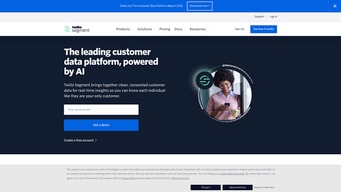

Unclaimed: Are are working at Segment ?
Segment Reviews & Product Details
Segment is a customer data platform that consolidates data from multiple sources to provide real-time insights and enhanced customer profiles. It enables businesses to personalize customer interactions by using AI-driven predictions and recommendations. Segment offers tools and integrations that help streamline data collection, management, and activation for targeted marketing campaigns and customer relationship management.

| Capabilities |
AI
API
CLI
|
|---|---|
| Segment |
Mid Market
Enterprise
|
| Ease of use |
Advanced
|
| Deployment | Cloud / SaaS / Web-Based |
| Support | 24/7 (Live rep), Email/Help Desk, FAQs/Forum, Knowledge Base |
| Training | Documentation |
| Languages | English |



Super easy to implement, ability to track multiple source and easilty connect the data. In addition, the integrations are super easy to set.
1. It get's super expensive once you grow and start sending many events. 2. It requires code to disable an intergration from a source.
Data across all of our assets, web and mobile.
It was very easy to setup in my webapp and their APIs are so simple. Segment has a lot of educational videos which help to improve the outcomes. Their integrations makes the work so much easier and simpler
Integrations with CRMs still complicated because of the way to match information into a deal
Have standarizes data across multiple tools in a easy and simple way
Powerful tool to collect all the data necessary to funnel into all the tools that we use today to understand our users, to optimize marketing campaigns, reach the right target audience and all of that with well-built integrations!
Nothing in particular that comes to mind
We tracked all the user interactions with Segment and piped the data into our analytics and marketing tools
Inflow and outflow of data. Help in managing multiple data source at once. Integration with all leading tools. Ease to manage.
Need technical expertise to setup. Customer support available only through mail or help documents.
Help in centralisting the code. Once segment is implement, no need to implement tool wise code. With the help of segment we can outflow data to number of tools like facebook, google ads, moengage etc.
Easy to use snippets and wide range of integration support without costing additional spending.
The documentaion is a bit confusing and requires additional research to implement.
Data pipeline from app to other destinations
Implementing Segment's tracked events is super easy and ends up being a fantastic lightweight all-in-one solution for tracking, planning, pruning, and reliably forwarding the events and properties that you want to destinations that they integrate into (which are MANY).
The user interface when building tracking plans or tracking plan libraries is a bit clunky and awkward to work with, as well as some of the navigation in the Segment UI.
Segment allows us to track events and event properties as well as user properties that meaningfully describe what our users are doing on our sites and thoroughly detail our customers and their changing makeup over time. Moreover, Segment allows us to clean out any noise that may come in from various systems and only send what we want to send where we want to send it (and be able to view the status of sent data). This has sped up our insight creation and made insights very reliable with current data synced on a schedule. Lots of hours have been saved by setting up Segment to do what we want it to.
Segment.com has proven to be an exceptional data collection platform, offering powerful capabilities for gathering data from multiple sources and seamless integration with various destinations. Its strengths lie in its user-friendly setup and efficient debugging process, making it an ideal choice for businesses seeking fast and reliable data transfers between applications like PostHog, Google Analytics, and Power BI. The experience when I switching data in Customer Success Platform from one to another is absolutely smooth. Another noteworthy aspect of Segment.com is its efficient debugging tools. Troubleshooting any potential issues during data transfer is quickly, thanks to the platform's comprehensive debugging features. The realtime debug can be seen when done your setup.
The billing management process could be more user-friendly. Having to handle billing-related matters via emails every time can be somewhat cumbersome. A streamlined and intuitive billing interface would be a welcome enhancement. Lack in supporting some specific software like Pipedrive CRM. It can be help via functional feature but hope become native in the futher
Segment solves the challenging problem of implementing tracking technology across multiple sites and platforms, including web, Android, and iOS. By offering a unified solution, Segment streamlines customer data collection and grouping processes. This benefit has been highly advantageous for our team, as it simplifies the way we manage and analyze data from various sources, providing us with a comprehensive view of our customers and their interactions
The segment is the state-of-the-art tool for real-time data collection basis the audience and environment from live applications/SDKs with support for integrations and data analytics
The segment is costly compared to other product analytics tools and has some synchronization challenges. Also, maintenance and monitoring require effort to keep the authentic and clean data
Segment helped us in collecting and analyzing the real-time data with good quality and consistent insights to manage the product strategy, campaigns and deliverables basis the trends observed
The Connection product is reliable and documentation is upto date, allowing someone to self serve and not rely on customer services. The customer services team are very helpful and transparent on when issues are being worked on or there is a delay.
The Event Delivery functionality within a destination (part of the Connections product) needs some work. It is confusing to know exactly the success / failure rate for a given time period.
- Sending data to our Snowflake data warehouse - Sending data to marketing destinations
Segment's UI and setup makes it incredibly user-friendly and easy to use. It's detailed documentation also gives you all the information you need to get started immediately.
There are a number of sources and destinations that are not available on Segment yet. Specifically CRM destinations and integrations.
We're sending all event-driven data from our website, app, and cloud sources via Segment to our data warehouse and a few key destinations. Being able to do with limited dev resources has been a massive time saver.